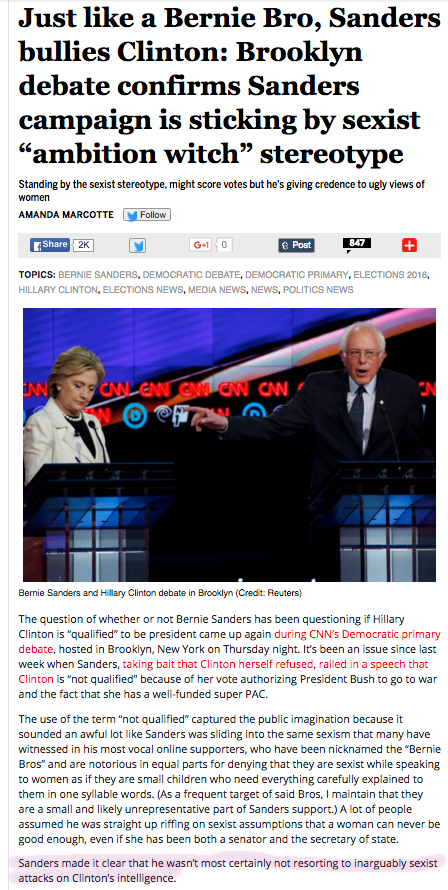"Wasn't most certainly not resorting"?
« previous post | next post »
Amanda Marcotte, "Just like a Bernie Bro, Sanders bullies Clinton: Brooklyn debate confirms Sanders campaign is sticking by sexist ambition witch stereotype", Salon 4/15/2016 (emphasis added):
Sanders made it clear that he wasn’t most certainly not resorting to inarguably sexist attacks on Clinton’s intelligence.
“Does Secretary Clinton have the experience and intelligence to be president? Of course she does,” Sanders replied when asked about it. “But I do question her judgment.” […]
So, to be excruciatingly clear here, Sanders is not talking about Clinton like she’s stupid. That said, that doesn’t mean he’s off the hook when it comes to whether or not this particular line of attack is sexist. There are ugly and unfair stereotypes used to discredit women besides assuming that they are blessed with less brainpower than men.
In context, the bolded sentence is apparently meant to mean that "Sanders made it clear that he wasn't resorting to attacks on Clinton's intelligence", or equivalently that "Sanders made it clear that he was most certainly not resorting to attacks on Clinton's intelligence".
So it's not clear why Marcotte added an extra negative.
For emphasis? For irony?
Or maybe an uncorrected editing error, due to (say) starting with "made it clear that he wasn't", deciding to switch to "was most certainly not",, and neglecting to change "wasn't" to "was"?
My guess is the editing error. But it goes in the misnegation file anyhow.
The obligatory screenshot:

John Shutt said,
April 16, 2016 @ 7:16 am
This one seems marginal to me, because it hovers on the periphery of a construct that isn't misnegation but simply informal. Sometimes one starts to say something, qualifies with an aside, then when continuing backs up by a few words to pick up the context again. When I do that in writing I do clarify the structure with some punctuation. "Sanders made it clear that he wasn’t, most certainly he was not resorting to inarguably sexist attacks on Clinton’s intelligence."
Ray said,
April 16, 2016 @ 8:35 am
this article reads in so many places as if there are two voices in the room (in the writer’s head?), talking with one another in parenthetical fragments (like this), which in speech could sound like normal punctuated elaborations or asides, but which in writing have become strangely punctuated (or not punctuated). my ears hear this as a kind of nervous woody allen delivery. or maybe she’s using a form of bro-speak.
first there’s the headline with its vaguely intrusive airquote:
Just like a Bernie Bro, Sanders bullies Clinton: Brooklyn debate confirms Sanders campaign is sticking by sexist (ambition witch, right?) stereotype
then there’s the weirdly punctuated sub-headline:
Standing by the sexist stereotype (might score votes, but hey) he’s giving credence to ugly views of women
and this odd equation:
and are notorious (in equal parts, dude!) for denying that they are sexist while speaking to women as if they are small children
and then the double negative whopper:
Sanders made it clear that he wasn’t (most certainly not, bro!) resorting to (like, inarguably!) sexist attacks on Clinton’s intelligence.
but what’s intriguing to me is that this “voices in my head” delivery style creeps into the whole underlying (and wobbling) logic of the piece:
A: gosh “she’s not qualified” sure sounds sexist!
B: wait sexism also includes attacking women for their ambitions!
C: omg, sanders is calling hillary an “ambition witch”!
Keith M Ellis said,
April 16, 2016 @ 11:58 am
It reads to me as intentional and ironic. Like Ray put it, "Sanders made it clear that he wasn’t (most certainly not!) resorting to inarguably sexist attacks on Clinton’s intelligence."
andyb said,
April 16, 2016 @ 4:59 pm
What's strange to me about this whole thing is that Hillary and her team let people go after the remark as sexist, even when it clearly isn't, when they had a much better way they could have used it.
Bernie was essentially claiming that anyone who even talks to the banks might as well be a Republican. Bernie as a 5% voice from the sidelines is expected to take that dogmatic line; Bernie as a 40% serious alternative who might be more electable than Hillary can't. He's claiming to be the latter, but still slips into talking like the former. That fits the general Hillary narrative of "Bernie is too extreme to win in November" perfectly, and yet nobody's picked up on it; instead, people are going into third-order examinations of whether the charge was misinterpreted because Bernie is not vocal enough in being serious about anti-sexism.
(I should point out that I personally think the opposite: Bernie should make the case against the mainstream even more strongly—it's what he believes, it's true, and it would make him even more electable in November, not less. I'm just surprised that nobody is using this to make the "too extreme" case that I disagree with.)
Robert Coren said,
April 18, 2016 @ 9:28 am
The bolded sentence is such a mess that I didn't even try to make sense of it.